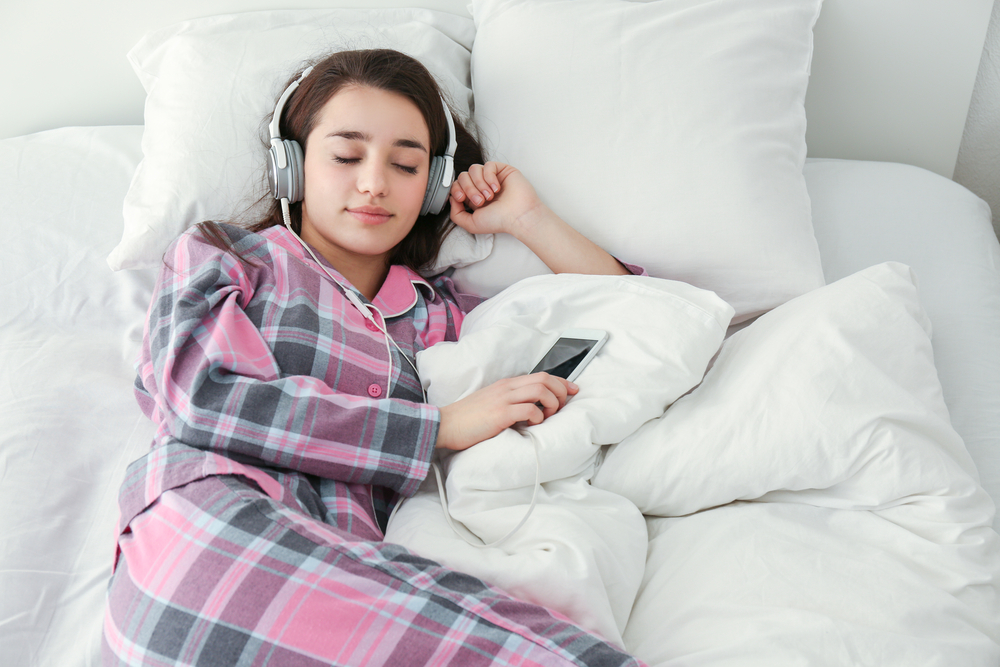How Music and Deep Sleep Music Can Help Insomnia
Any parent can attest to the soothing effects of a lullaby. The calming, therapeutic effects of gentle music help us to relax and fall asleep more quickly, even as adults. Let’s learn more about deep sleep music for adults with sleeping issues.
About Music and Sleep
Listening to 45 minutes of music before bedtime can improve sleep quality on the first night, according to one study. Participants indicate a cumulative effect, improving sleep quality the more frequently they include music in their bedtime strategy.
This practice not only improves sleep quality but can also help you to fall asleep more quickly because you are relaxed, allowing your body to do what it does naturally: fall asleep. Another significant plus for music at bedtime is how it improves sleep efficiency, meaning that you are sleeping for more of the time you are in bed.
Therapeutic applications of music have appeared throughout history. As a treatment for mental illness in ancient Greece, they worked side-by-side with physicians in ancient Arabic cultures and postwar hospitals to facilitate the healing of physical and emotional trauma for soldiers.
Music and Hormones
Numerous studies indicate that music aids in regulating hormones like cortisol, the stress hormone, and dopamine, the pleasure hormone. Higher cortisol levels contribute to stress and inflammation that keep you awake at night.
The release of dopamine raises your mood and aids in reducing acute and chronic physical pain, which creates significant challenges to achieving adequate rest.
Music can also calm the autonomic nervous system, which controls unconscious processes like our heart, lungs, and digestive system, helping reduce blood pressure, slow breathing, and lower our heart rate.
The Right Kind of Music
There is no denying the impact of music on our feelings and emotions. Although we are talking about using music to relax, de-stress, and reduce anxiety so we can fall asleep naturally, music can also deliver the opposite effects.
While soothing and relaxing melodies and sounds can provide all the benefits for sleep we are discussing here, more energizing and upbeat music can stimulate the brain for mental focus, creativity, physical coordination, and heightened awareness. Stimulating music can also affect hormones, including adrenaline, which increases attentiveness.
For these reasons, you must choose music that provides the type of rhythm, tones, and ambiance that reduce stress and anxiety to bring yourself into a relaxed state where your body can run its natural course and fall asleep.
Ideally, you can find some curated tracks of Deep Sleep Music intentionally designed for your purposes and to improve your overall sleep quality and efficiency.
About Deep Sleep Music
Deep sleep music is intentionally curated to promote deep relaxation to aid in falling asleep. Typically, it includes gentle and calming melodies, instrumental arrangements, and natural sounds, fostering a tranquil listening experience that relaxes the mind and body.
This music genre has a slower tempo at lower frequencies and with a minimum of variations to help shift your brain waves to the delta frequency range. This alignment brings about a more refreshing, restful sleep cycle.
What’s happening?
As we listen to deep sleep music, our brain waves will naturally synchronize with the music through the process of entrainment, slowing brain activity and prompting a state of deep relaxation for a more restful night.
From ancient times to today’s sophisticated studies and research, music has played a vital role in the human experience, especially regarding sleep. The soothing tones of lullabies are famous for lulling babies and children to sleep.
No one can deny the significance of music in our daily lives.
With new knowledge of how music can affect brain waves and instill a sense of calm and relaxation that allows our body to do what it does naturally, modern society has a leg up with music designed to foster the ideal sleep environment.
Given all the benefits of deep sleep music and music in general regarding sleep quality, it makes sense to incorporate this strategy into your sleep hygiene and bedtime ritual. After all, music and deep sleep music are more available than ever, with countless options for downloads and subscriptions.
At Sleep Science Academy, we are all about natural insomnia remedies. Sleeping pills and sleeping aids treat the symptoms and do nothing to eliminate the root cause. Typically, stress and anxiety, along with a racing mind, are the root causes of insomnia, and deep sleep music is an ideal strategy to neutralize those issues.
Combining deep sleep music with our Dynamic Sleep Recalibration (DSR) program’s targeted support is a solid plan for combating insomnia. In this uniquely empowering and individualized program, clients work with their certified holistic health/sleep coach, who guides them toward a lifetime of peaceful, serene, restorative rest.
You can learn more about The Sleep Science Academy Difference in this article. Then, contact us to schedule your complimentary sleep consultation about what Sleep Science Academy can do to help you achieve a lifetime of peaceful nights and productive days.

